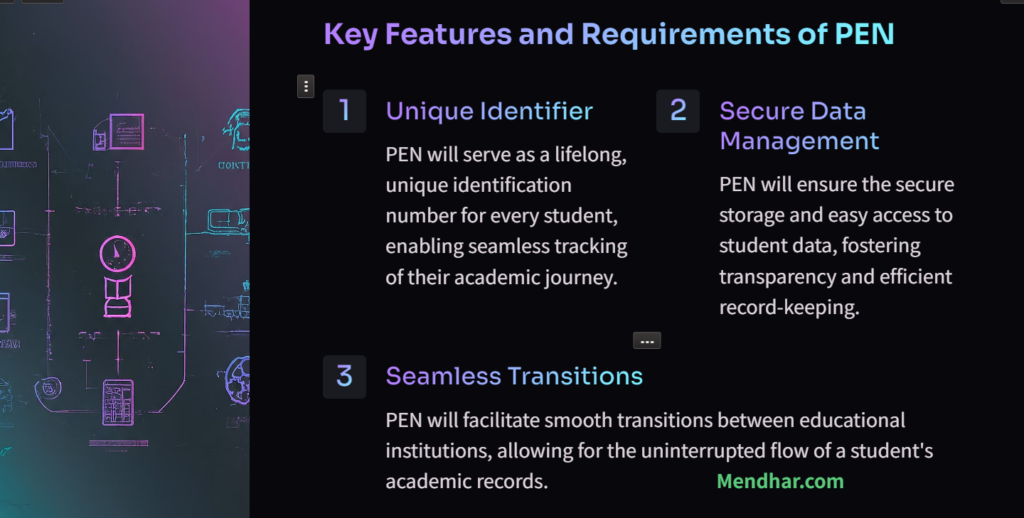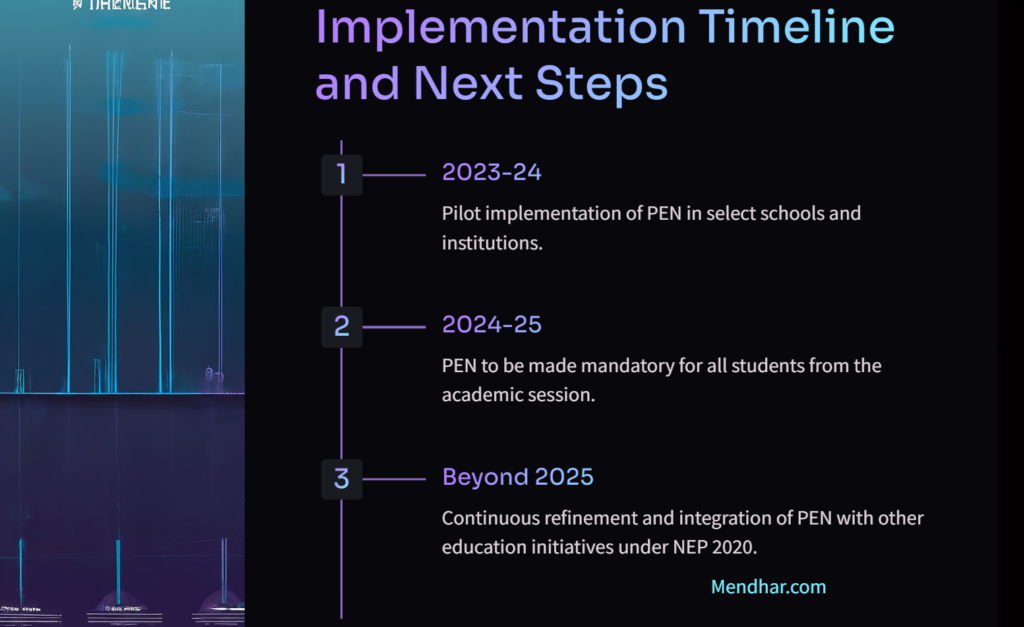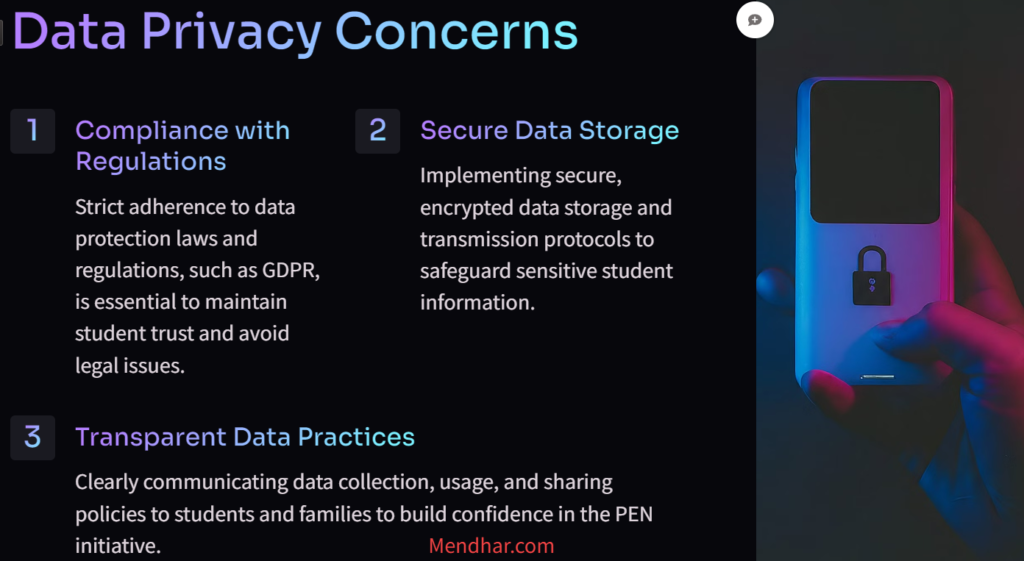Table of Contents
TogglePen Mandatory for Students: A Game-Changer in India's Education Landscape

INTRODUCTION
The introduction of the Personal Education Number (PEN) by the Government of India represents a significant leap forward in the realm of education reform. This mandate, slated to commence from the academic session of 2024-25, reflects a concerted effort to modernize and streamline educational practices in the country. Aligned with the overarching vision outlined in the National Education Policy (NEP) 2020, the introduction of PEN aims to revolutionize the way student information is managed and utilized across the education landscape.
So, what exactly does this mean for students and the education system at large?
First and foremost, the PEN system promises to provide each student with a unique identifier that will accompany them throughout their educational journey, from primary school to higher education and beyond. This personalized identifier will serve as a comprehensive record of the student’s academic achievements, extracurricular activities, and other pertinent information. By centralizing this data under a single identifier, the PEN system aims to simplify administrative processes, facilitate data-driven decision-making, and enhance accountability within the education sector.

Understanding the PEN Initiative:
The introduction of the Personal Education Number (PEN) initiative mandated under the National Education Policy (NEP) 2020 signifies a paradigm shift in how student information is managed and utilized across the education sector in India. At its core, the PEN initiative aims to assign a unique identification number to each student, which will serve as a comprehensive record of their educational journey from pre-school through higher education and potentially into the workforce. Let’s delve deeper into the various aspects and potential implications of this transformative initiative:
Streamlining Data Management: The PEN initiative seeks to centralize student data under a single identifier, streamlining the often fragmented and decentralized systems of data management prevalent across educational institutions. By maintaining a unified record of each student’s academic achievements, extracurricular activities, attendance records, and other pertinent information, the PEN system simplifies administrative processes and reduces redundancies, thereby improving efficiency and accuracy in data management.
Facilitating Personalized Learning: With the proliferation of educational technologies and data analytics tools, personalized learning has emerged as a key priority in educational reform efforts. The PEN system lays the foundation for personalized learning by providing educators with access to comprehensive student profiles, including their learning preferences, strengths, weaknesses, and areas for improvement. Armed with this information, educators can tailor instruction to meet the diverse needs and learning styles of individual students, fostering greater engagement, motivation, and academic success.
Enhancing Accountability: The PEN initiative enhances accountability within the education ecosystem by promoting transparency and data-driven decision-making. By maintaining a standardized record of student performance and progress, the PEN system enables educators, policymakers, and parents to monitor educational outcomes, identify areas of concern, and implement targeted interventions to support student learning and development. Additionally, the PEN system can serve as a tool for evaluating the effectiveness of educational policies and programs, facilitating evidence-based policy reforms and continuous improvement efforts.
Promoting Lifelong Learning: Beyond tracking students’ educational journey within formal schooling, the PEN initiative has the potential to promote lifelong learning by capturing a holistic record of individuals’ educational attainment and achievements throughout their lives. By extending the PEN system to encompass lifelong learning opportunities, such as vocational training, adult education, and continuing education programs, policymakers can empower individuals to pursue learning opportunities tailored to their evolving needs and aspirations, thereby fostering social mobility, economic empowerment, and inclusive growth.

Impact on Students:
For students, the introduction of PEN brings several benefits and opportunities:
- Seamless Transition: The PEN will facilitate seamless transitions between different educational levels and institutions, ensuring continuity and coherence in the learning process.
- Access to Resources: With improved data management, students can gain better access to educational resources, support services, and opportunities for academic advancement.
- Recognition of Achievements: The PEN will serve as a digital record of students’ academic achievements, extracurricular activities, and other accomplishments, enhancing their profile for future endeavors.
Challenges and Considerations:
Indeed, the PEN initiative, while holding significant promise for transforming the education landscape in India, is accompanied by several challenges that must be addressed to ensure its successful implementation. Let’s delve into these challenges in greater detail:
Data Privacy Concerns: One of the foremost challenges facing the PEN initiative is the need to safeguard student data privacy and ensure compliance with data protection regulations. Given the sensitive nature of educational data, including academic performance, attendance records, and behavioral assessments, it is imperative to establish robust protocols for data collection, storage, and sharing. Additionally, measures must be put in place to prevent unauthorized access, data breaches, and misuse of student information. Transparent policies regarding data ownership, consent, and access rights must be established to build trust among students, parents, educators, and other stakeholders.
Infrastructure and Connectivity: Disparities in infrastructure and connectivity pose significant hurdles to the equitable implementation of the PEN initiative across different regions of India. While urban centers may boast advanced technology infrastructure and high-speed internet connectivity, rural and remote areas often lack basic amenities such as electricity and internet access. Addressing these disparities requires concerted efforts to expand infrastructure development and improve connectivity in underserved communities. This may involve investments in digital infrastructure, such as broadband expansion, establishment of computer labs, and provision of mobile devices, as well as innovative solutions like satellite internet technology to reach remote areas.
Capacity Building: Effective implementation of the PEN initiative hinges on building the capacity of educators, administrators, and support staff to leverage the system’s capabilities effectively. This entails providing comprehensive training programs to familiarize stakeholders with the PEN system’s functionalities, data management protocols, and privacy safeguards. Additionally, ongoing professional development opportunities should be offered to keep educators abreast of emerging trends and best practices in educational technology and data analytics. Collaboration with educational institutions, government agencies, and private sector partners can facilitate capacity-building efforts and promote knowledge sharing and collaboration.
Digital Literacy and Inclusion: Ensuring equitable access to the benefits of the PEN initiative requires addressing disparities in digital literacy and inclusion among students, parents, and educators. Many individuals, particularly in marginalized communities, may lack the necessary digital skills and resources to effectively navigate digital platforms and tools. To bridge this gap, targeted interventions such as digital literacy training programs, community outreach initiatives, and provision of subsidized or free digital devices may be necessary. Moreover, efforts should be made to ensure that the PEN system is accessible to individuals with disabilities and accommodates diverse linguistic and cultural needs.

Conclusion:
The introduction of PEN as mandatory for students from the academic session 2024-25 heralds a new era of accountability, transparency, and innovation in India’s education system. By leveraging digital technologies and data-driven insights, the PEN initiative holds the potential to revolutionize the way students learn, educators teach, and policymakers plan for the future. As we embark on this transformative journey, let us embrace the opportunities and challenges that lie ahead, with the shared goal of nurturing a generation of empowered learners and leaders.
Frequently Asked Questions (FAQs) About the Mandatory PEN Initiative for Students
1. What is the PEN initiative, and why is it mandatory for students?
- The Personal Education Number (PEN) initiative is a unique identification system mandated under the National Education Policy (NEP) 2020 of India. It assigns a distinct number to each student to track their educational journey comprehensively. It’s mandatory to enhance data management, personalize learning, and ensure accountability within the education sector.
2. How will the PEN initiative benefit students?
- The PEN initiative offers several benefits to students, including seamless transitions between educational levels, improved access to resources, and recognition of their achievements. It also facilitates personalized learning experiences tailored to their individual needs.
3. What implications does the PEN initiative have for educators?
- Educators can leverage the PEN initiative to gain insights into student learning patterns, provide targeted support, and enhance professional development opportunities. It emphasizes the importance of data literacy and digital skills among educators.
4. How can students obtain their PEN?
- The process for obtaining a Personal Education Number (PEN) may vary depending on the guidelines issued by educational authorities. Typically, students may receive their PEN from their respective educational institutions or through online registration portals.
5. Will the PEN initiative impact data privacy and security?
- Safeguarding student data privacy and ensuring compliance with data protection regulations are critical considerations in the implementation of the PEN initiative. Educational institutions must establish robust protocols to protect student information and prevent unauthorized access.
6. What challenges may arise with the PEN initiative?
- Challenges such as disparities in infrastructure and connectivity, data privacy concerns, and the need for capacity building among educators may arise during the implementation of the PEN initiative. Addressing these challenges will be essential for its success.
7. How will the PEN initiative be implemented across different educational levels?
- The implementation of the PEN initiative will require collaboration between educational authorities, institutions, and stakeholders at various levels. Guidelines and protocols will be established to ensure uniformity and consistency in assigning and managing PENs across different educational levels.
8. Can students use their PEN for purposes other than education?
- The primary purpose of the Personal Education Number (PEN) is to track students’ educational journey and facilitate data management within the education sector. While students may use their PEN for educational purposes, its applicability to other domains may be limited.
9. How will the PEN initiative contribute to the overall goals of the National Education Policy (NEP) 2020?
- The PEN initiative aligns with the overarching goals of the NEP 2020, such as promoting equitable access to quality education, fostering personalized and holistic learning experiences, and enhancing accountability and transparency within the education system. It serves as a cornerstone for realizing these objectives.




Hello,
We provide funding through our venture capital company to both start-up and existing companies either looking for funding for expansion or to accelerate growth in their company.
We have a structured joint venture investment plan in which we are interested in an annual return on investment not more than 10% ROI. We are also currently structuring a convertible debt and loan financing of 3% interest repayable annually with no early repayment penalties.
We would like to review your business plan or executive summary to understand a much better idea of your business and what you are looking to do, this will assist in determining the best possible investment structure we can pursue and discuss more extensively.
I hope to hear back from you soon.
Sincerely,
Syed Atif
Investment Director
Devcorp International E.C.
P.O Box 10236 Shop No. 305
Flr 3 Manama Centre, Bahrain
Email: syedatif@devcorpinternationalbh.com
Website: https://devcorpinternational.com
Pingback: Padhe Bharat, Badhe Bharat -